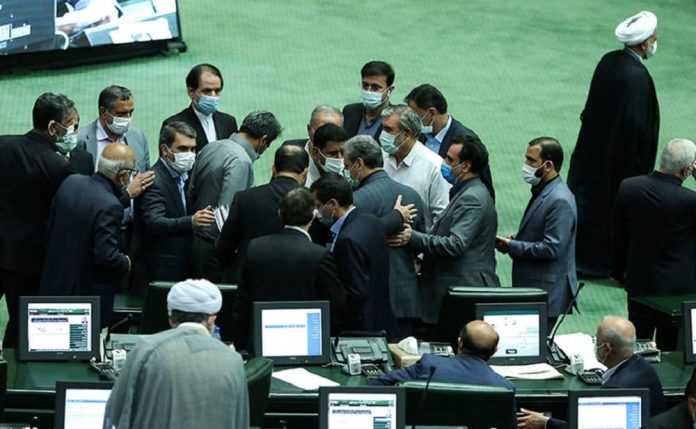Exploiting Gaza Conflict, Iran’s Regime Accelerates Political Consolidation Project

majlis
Written by
Farid Mahoutchi
After purging universities, government institutions, and lower-level government positions from individuals who are not fully aligned with the regime, Iranian regime leaders have turned their attention to the Parliament.
On Friday, the Election Headquarters, affiliated with the Ministry of Interior of Ebrahim Raisi’s government, announced the results of their review of the “eligibility of candidates” for the twelfth parliamentary elections. According to government reports, as of Saturday, 25 sitting members of parliament, including four women, have been disqualified from participating in the upcoming elections by executive committees consisting of representatives from the Ministry of Intelligence, the IRGC Intelligence Organization, Civil Registration Organization, the State Security Forces, and the Judiciary.
In response to criticisms from media outlets aligned with the disqualified candidates, the head of the Election Headquarters justified the decisions made by the executive committees. He argued that these representatives were not disqualified but rather they “failed to meet the required criteria.”
The Mashregh newspaper, linked to the IRGC Intelligence Organization, reported on November 13, “During a session of the Tehran Province Election Headquarters, Seyed Mohammad Taqi Shahcheraghi, the head of the country’s Election Headquarters, referred to the election strategies outlined by the Supreme Leader and emphasized that the people are the primary organizers of the elections. He stated that all members of the executive, supervisory, and branch committees were selected from within society and the general population. He stressed that their role as election executives was to coordinate the implementation of the strategies conveyed, thereby complementing the people’s role in organizing the elections.”
In an article titled “Elections in the Realm of Hezbollah Supporters,” published on November 12, the state-run “Jahan-e San’at” newspaper pointed out that the common ground among these disqualified individuals was their “expressed criticisms of the government under Ebrahim Raisi.
The government-run news agency, IRNA, backed the disqualification and accused a self-identified “reformist” group of attempting to regain power. IRNA asserted that the scrutiny of candidates’ eligibility for the twelfth parliamentary elections provided reformists with an opportune platform to not only critique the government’s consolidation efforts but also further their own political aims.
The Origins and Impact of a Failed Consolidation Project in #Iranhttps://t.co/sab1UktUwv
— NCRI-FAC (@iran_policy) October 31, 2023
Nevertheless, the regime was also wary of political backlash. During his Friday prayer sermon on November 10, Ahmad Khatami called on the disqualified individuals to work for the betterment of the country and not to challenge the system. He stressed that safeguarding the state’s integrity is a duty. Ahmad Khatami also encouraged those affected not to lose hope and not to discourage the public.
Khatami highlighted the primary concern of the regime, stating, “Increasing voter turnout is a religious, national, revolutionary, faith-based, and ethical obligation for all of us. Let us participate ourselves, encourage others to participate, and create more opportunities for voter turnout… Even a single vote or a one percent increase in votes can have a significant impact on the country’s progress and the influence of the Islamic Revolution’s discourse in the region, Iran, and the world.”
On the other hand, Mohammad Mokhtari, the Friday prayer leader of Birjand, straightforwardly referred to those who had been disqualified as “a group of foreign mercenaries.” In his Friday prayer sermon, he asserted, “We are still susceptible during elections… First and foremost, we must reach a point where this revolutionary movement doesn’t halt every four or eight years when a group of foreign mercenaries fails to secure votes. Then, hopefully, with the help of this Resistance Axis, we can empower the Middle East and Islamic nations and rescue them.”
The statements from Khamenei’s representatives vividly reveal the challenging situation facing the Tehran regime. Struggling with internal discontent and defections at various levels, Khamenei appears determined to eliminate those who don’t align closely with his views and suppress any signs of disagreement.
By bringing Raisi to power and closing ranks, regime dictator Ali Khamenei seeks to overcome the numerous crises that have engulfed his regime and to confront daily protests and future popular uprisings. #Iran#MyVoteRegimeChange
— Mohammad Mohaddessin (@Mohaddessin) May 15, 2021
Khamenei is employing a strategy of regional aggression to delay an impending revolution, while simultaneously using the Gaza conflict as an opportunity to eliminate potential domestic rivals. Some individuals who initially did not support Khamenei’s leadership during the 2022 uprising have shifted their stance and expressed their backing after the Gaza crisis. They believed that this alignment might grant them a chance to share power. However, Khamenei has now made it clear that the regime’s situation is too precarious to offer them another opportunity.
On November 12, responding to the removal of current parliament members and concerns about more purging by the Guardian Council, Ettela’at newspaper issued a warning about the fate of the regime, writing, “During these past two years, as we have witnessed the outcomes of consolidation and purification, we have tasted the bitter results. What benefits or improvements have been gained from it that we are now striving to strengthen it?”
Warning of social upheaval, Ettela’at added: “If proactive measures are not taken to address the looming crises, it will result in significant and irreversible damage, affecting both the social cohesion and the territorial integrity, vital resources, and national assets. Neglecting these issues is neither permissible nor practical.”
Exploiting Gaza Conflict, Iran’s Regime Accelerates Political Consolidation Project

